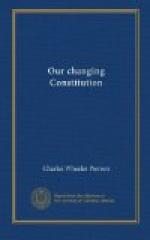The right of citizens
of the United States to vote shall not
be denied or abridged
by the United States or by any state on
account of sex.
In other words, it adopts verbatim the phraseology of the Fifteenth Amendment, merely substituting the word “sex” for the words “race, color, or previous condition of servitude.”
So much for the historical background of the so-called Susan B. Anthony Amendment. It remains to consider just how far the amendment constitutes an encroachment by the Federal Government on the powers of the states.
In so far as it affects the qualifications of voters at national elections (i.e., for president, senators, representatives) the encroachment is more apparent than real. As has already been pointed out, this is essentially a national question, and the Constitution adopted the suffrage qualifications prescribed by state law, not as a matter of principle, but for reasons of expediency and convenience.
In so far, however, as the amendment imposes woman suffrage on the states in elections of state and local officials the situation is entirely different. That staunch advocate of national power, Alexander Hamilton, said in the Federalist:[1]
Suppose an article had been introduced into the Constitution, empowering the United States to regulate the elections for the particular states, would any man have hesitated to condemn it, both as an unwarrantable transposition of power, and as a premeditated engine for the destruction of the state governments?
[Footnote 1: Federalist LIX.]
What Hamilton scouted as impossible has been accomplished in the Nineteenth Amendment. It in effect strikes out the word “male” from the suffrage provisions of state constitutions. It overrides state policy and interferes with the right of states to manage their own affairs. From the theoretical standpoint a more serious inroad on state prerogatives would be hard to find. Control of the suffrage is one of the fundamental rights of a free state. It belonged to the North American states before their union, and was not surrendered to the National Government when the union was effected. Moreover, the encroachment has a very practical side. To confer the suffrage on the educated women of Connecticut was one thing; to confer it on the Negro women of Alabama was quite a different matter, involving different considerations. The amendment took no heed of such differences but imposed a uniform rule on all the states, regardless of local prejudices or conditions.
It is true that a somewhat similar encroachment on state power had been made by the Fifteenth Amendment, designed to enfranchise the Negroes. That amendment, however, had its origin in conditions growing out of the Civil War, and claimed its justification in the necessity for protecting the freed slaves against hostile state action. It was avowedly an emergency measure, and the success with which it has been nullified in some quarters testifies to the unwisdom of forcing such measures upon reluctant states.




